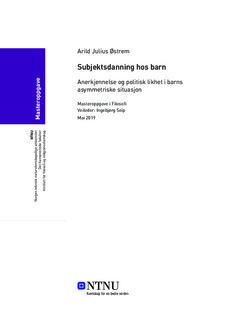| dc.contributor.advisor | Seip, Ingebjørg | |
| dc.contributor.author | Østrem, Arild Julius | |
| dc.date.accessioned | 2019-09-06T14:01:05Z | |
| dc.date.available | 2019-09-06T14:01:05Z | |
| dc.date.issued | 2019 | |
| dc.identifier.uri | http://hdl.handle.net/11250/2613107 | |
| dc.description.abstract | En filosofisk undersøkelse av menneskets subjekt må ta i betraktning at det aktuelle subjektet startet som et barn. In denne oppgaven skal jeg presentere de sentrale teoriene for å forstå subjektsforståelsene i Hegels herre-trell-dialektikk i de første kapitlene i Åndens fenomenologi, og subjektet som borger i det aktive livet, i Hannah Arendts Vita Activa. Jeg vil ta utgangspunkt i kravene til og definisjonene på subjektivitet som stilles her, for å kontekstualisere subjektsdannelsen til barndommen, undersøke problemene som oppstår i den konteksten og utforske noen mulige løsninger. Instrumentaliteten i noen oppdragelsessituasjoner, barns behov for omsorg og kjærlighet og asymmetrien i maktrelasjonen er alle ting som kan skape utfordringer for subjektsdanning i barndommen. Disse utfordringene må håndtere, men siden de også er en del av barns situasjon kan de ikke fullstendig overkommes. I det siste kapitelet skal jeg analysere den menneskelige psyke som dels ubevisst gjennom å undersøke teoriene presentert av Sigmund Freud og Pierre Bourdieu. Å se på deler av relasjonen åpner for muligheten for å analysere relasjonen mellom barn og voksne som en relasjon mellom undertrykte og undertrykkere, noe jeg vil gjøre gjennom å sammenligne den med sånn Simone de Beauvoir beskriver kvinners situasjon. Gjennom å betrakte barn som undertrykte kan vi se barns subjektsdanning med samme blikk som frigjøring av undertrykte grupper, og i siste del av oppgaven ønsker jeg å gjøre det, gjennom å anvende Paulo Freires De undertryktes pedagogikk og Sandra Hardings standpunkteori på deres situasjon. | |
| dc.description.abstract | A philosophical investigation of the human subject needs to take into consideration that the subject in question started out as a child. In this thesis I will present the theories central to understanding the view on the subject as recognized, in Hegel’s master and slave dialectics in first chapters of The Phenomenology of Spirit, and the subject as citizen in the active life in Hannah Arendt’s The Human Condition. From the definitions and conditions made by these models of subjectivity I will contextualize the forming of the subject in the childhood, examine problems that arise from this context and explore some possible solutions. During the forming of the subject, the instrumentality of some situations of the upbringing, children’s need for care and love and the asymmetry of the power relation all poses challenges. These must be dealt with, but since they are part of children’s situation, they cannot be overcome completely. In the final chapter, I will analyze the human psyche as partly subconscious by looking at theories presented by Sigmund Freud and Pierre Bourdieu. Viewing part of the relation as subconscious opens the possibility to analyze the relation between children and adults as a relation between oppressed and oppressors, which I will do by comparing it to women’s situation, as described by Simone de Beauvoir. To view children as oppressed allows us to view the forming of children’s subject though the same lens as the liberation of other oppressed groups, and in the last part of the thesis I want to do that, by applying Paulo Freire’s Pedagogy of the Oppressed and Sandra Harding’s standpoint theory to their situation. | |
| dc.language | nob | |
| dc.publisher | NTNU | |
| dc.title | Subjektsdanning hos barn. Anerkjennelse og politisk likhet i barns asymmetriske situasjon. | |
| dc.type | Master thesis | |
